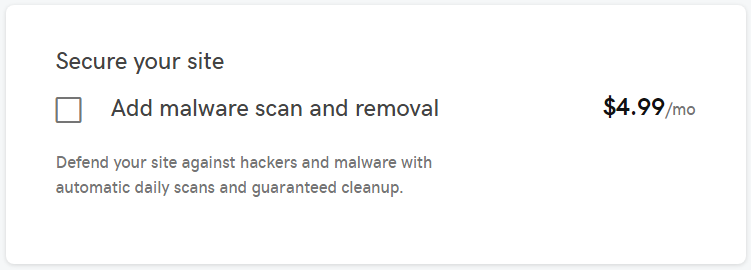Yesterday we discussed GoDaddy’s usage of misleading claims to try to sell overpriced SSL certificates. Based on that it probably wouldn’t be surprising to hear that they would mislead people in other ways about security and that is exactly what we ran across while looking into things while working on that previous post. When we clicked on the “Add to Cart” button for one of their SSL certificates, at the bottom of the page we were taken to, there was a “malware scan and removal” service offered to “Secure your site”:
The description of that is:
Defend your site against hackers and malware with automatic daily scans and guaranteed cleanup.
It shouldn’t be too complicated to understand what is wrong with that, though as we mentioned earlier today there seems to be a lot of confusion when it comes to what security services and products do.
If a website is secure it wouldn’t have malware or some other hack on it to detect or remove, so either GoDaddy doesn’t understand what they are providing or they are lying about.
The problem we see so often with this sort of service is that people will fail to do the things that will actually keep websites secure because they believe a service like this will actually keep a website secure.
Trying to deal with the after effects of having a website hacked instead of actually securing it introduces a lot of issues. One of those being that if a hacker uses the hack to exfiltrate customer data stored on the website a cleanup isn’t going to undo that.
What is a lot more important to note is that everything we have seen from the underlying provider of GoDaddy’s security services, Sucuri, is that they are not good at detecting and cleaning up hacks of websites. Their scanner seems, to put it politely, incredibly crude. Their employees seem to lack a basic capability to understand evidence that a website is hacked. And in what is most relevant to this specific service, we recently we brought in on a situation where their scanner had failed to detect that a website was hacked and then they repeatedly incompletely cleaned up the website, leaving it in a hacked state for a while. It was only after we were brought in to clean things up properly (which Sucuri doesn’t appear to even attempt to do) that it was finally cleaned and stayed that way.
